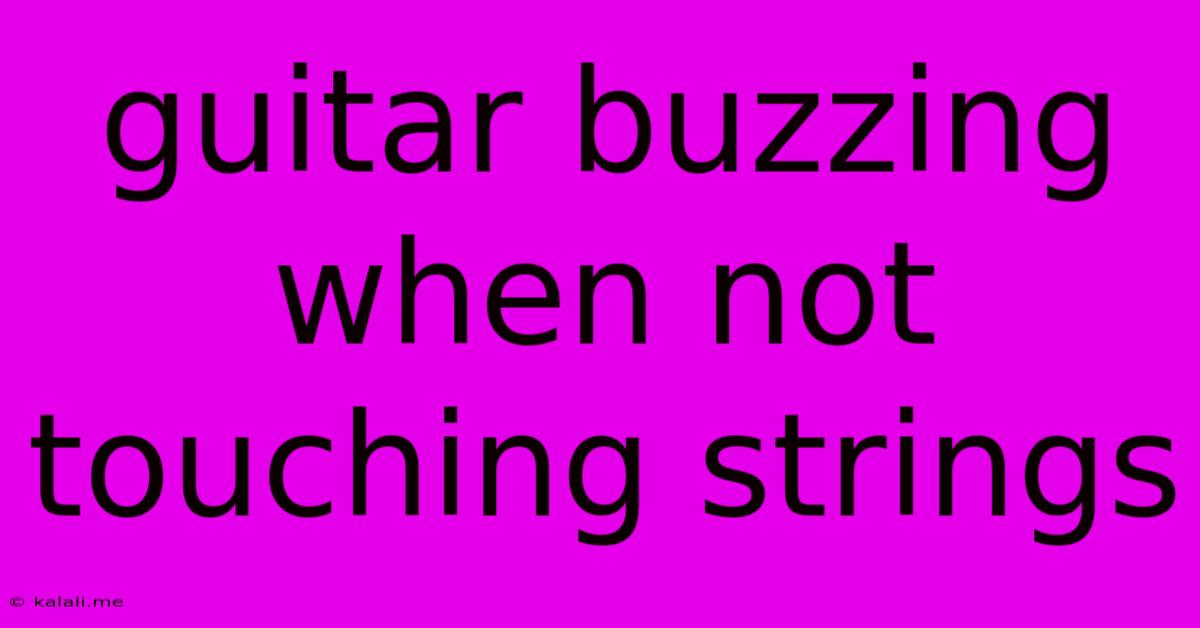Guitar Buzzing When Not Touching Strings
Kalali
May 25, 2025 · 3 min read

Table of Contents
Guitar Buzzing When Not Touching Strings: Troubleshooting and Solutions
A buzzing guitar, even when you're not touching the strings, is a frustrating problem for any guitarist. This annoying hum can ruin your practice sessions and performances. Fortunately, it's usually a fixable issue stemming from several common causes. This guide will walk you through troubleshooting this problem, identifying potential culprits, and providing practical solutions to get your guitar sounding its best.
Understanding the Source of the Buzz
A buzzing guitar when not playing is often due to vibrations transferring from the instrument's body to the strings or pickups. Several factors can contribute to this unwanted noise, including poor grounding, high-output pickups, electromagnetic interference (EMI), and structural issues within the guitar itself. Let's dive into each of these possibilities.
1. Grounding Issues:
This is the most common cause. A faulty ground connection can allow unwanted electrical noise to enter the signal chain. The buzz is often a consistent hum, and its intensity might vary based on your proximity to electrical devices.
- Check your cables: Inspect your guitar cable for any damage, especially near the connectors. A frayed or broken cable can easily introduce noise. Try replacing it with a known good cable to rule this out.
- Examine your guitar's ground: This might require opening your guitar (carefully!), examining the wiring, and ensuring all grounds are properly connected. This task is best left to a professional luthier if you lack experience with guitar electronics.
- Inspect the input jack: A faulty input jack is another potential ground issue. A loose or damaged jack can lead to intermittent buzzing.
2. High-Output Pickups:
High-output pickups, designed for increased gain and distortion, are more susceptible to picking up hum. Their sensitivity to electromagnetic fields can amplify background noise.
- Consider the pickup's design: Some pickup types are inherently more prone to hum than others. Humbuckers generally offer better noise cancellation than single-coil pickups.
- Shielding: Internal shielding inside the guitar body can greatly reduce the pickup's sensitivity to outside electromagnetic interference.
3. Electromagnetic Interference (EMI):
External electromagnetic fields from various electronic devices (computers, power supplies, fluorescent lights) can induce a buzz in your guitar.
- Identify nearby electronic devices: Try moving your guitar away from potential sources of EMI. Experimenting with different locations in the room can help pinpoint the source.
- Power conditioner: If the problem persists, a power conditioner might reduce noise caused by fluctuations in the power supply.
4. Structural Issues:
Loose parts or vibrations within the guitar itself can sometimes cause a buzz, especially with older or poorly constructed instruments.
- Check for loose hardware: Inspect the bridge, tuning pegs, and neck screws. Tighten any loose parts to eliminate vibrations.
- Neck relief: An improperly adjusted neck relief can contribute to unwanted vibrations. Have a professional luthier check and adjust your neck relief if necessary.
5. Pickup Height:
Incorrectly adjusted pickup height can impact the overall tone and noise level. Adjusting the height of your pickups can minimize unwanted buzz.
- Adjust pickups carefully: Use a screwdriver to slightly adjust the height of your pickups. Small adjustments can make a significant difference. Consult online resources for specific instructions on your guitar model.
Addressing the Buzz: Practical Solutions
Once you've identified the potential source of the buzz, take appropriate action. Often, a simple cable replacement or tightening loose hardware is all it takes. For more complex issues, consulting a qualified guitar technician or luthier is recommended to avoid potential damage to your instrument. Remember, preventing future problems involves regular maintenance, including inspecting your cable and hardware, keeping your guitar clean and properly stored.
By systematically addressing these potential issues, you'll effectively troubleshoot your buzzing guitar and restore its sweet, quiet tone. Remember to tackle the simplest potential causes first. With a bit of patience and the right approach, you can get back to playing without the annoying buzz.
Latest Posts
Latest Posts
-
Untitled Goose Game Break The Broom
May 25, 2025
-
How Long Does Bleeding Brakes Take
May 25, 2025
-
How To Take A Screen Out Of A Window
May 25, 2025
-
Mobile Data Working But Hotspot Not Working
May 25, 2025
-
How To Say Login In Spanish
May 25, 2025
Related Post
Thank you for visiting our website which covers about Guitar Buzzing When Not Touching Strings . We hope the information provided has been useful to you. Feel free to contact us if you have any questions or need further assistance. See you next time and don't miss to bookmark.